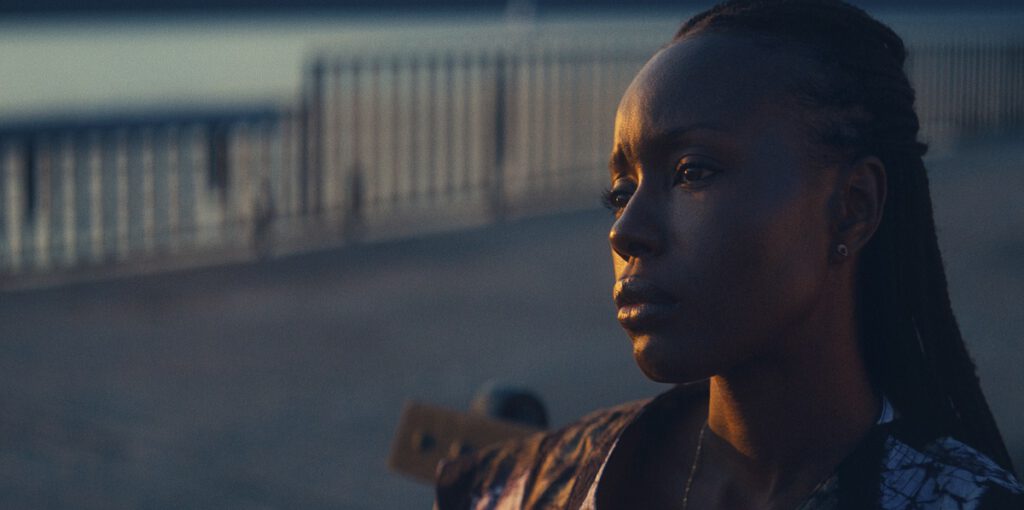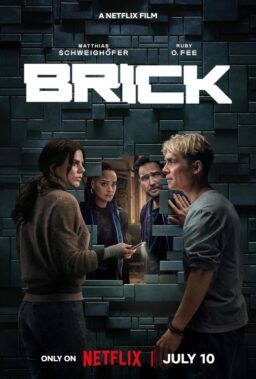When you meet Anna Diop, the ebullient star of writer/director Nikyatu Jusu’s “Nanny,” you notice how closely her fearlessness as an actor aligns with the film’s potent protagonist. In Jusu’s debut feature, Diop plays the determined, hardworking Aisha. Living in New York City as an undocumented Senegalese emigrant, Aisha takes a high-paying job as a nanny for an affluent white Manhattan family in the hopes of saving enough money to bring her young son over to America.
Her employers—the corporate manager Amy (Michelle Monaghan) and the exploitative photojournalist Adam (Morgan Spector)—bring her on to care for their daughter Rose. The gig begins well enough but soon unravels under the guise of micro and major aggressions and other interpersonal foibles. While Aisha catches the eye of a charming doorman named Malik (Sinqua Walls), she barely enjoys his caring attention before she begins experiencing hallucinations. And her son, mysteriously, rarely appears on her video chats with people back home. Is she overreacting? Is it all in her head? Or is some darker presence afflicting her?
In this smart and agile horror flick, bursting with West African folklore, lush lighting, erupting soundscapes, and themes of alienation and othering, Diop shoulders the psychic shocks of a woman and mother pushed to the edge of something unrecognizable. Diop plays Aisha with sensitivity and force, vulnerability yet guardedness, and an unmistakable brightness that invites anxiety when circumstances pull her physically back down to earth. It’s a palpable performance—the heartbeat of Jusu’s bold, uncompromising vision—that is nothing short of a revelation.
During the Chicago International Film Festival, where she received the festival’s Rising Star Award, Anna Diop met with RogerEbert.com to discuss how she prepared for the role of Aisha, finding chemistry with co-star Sinqua Walls, and filming those terrifying water scenes.
How did you become attached to “Nanny”?
I was aware of Nikyatu Jusu about a year before I even read the script. I was aware of her because of “Suicide by Sunlight,” which is a short she did. And I was like: Who is this filmmaker? Because the story was original and it was bold and it was elevated, and I had been longing to find someone like that to work with. When “Nanny” was greenlit, they were looking to cast Aisha, so we finally met over Zoom and I read the date scene with Malik. Nikyatu, she plays her cards really close, so she didn’t tell me that she liked me. I didn’t know that I got the role for weeks. She had me do a series of chemistry reads, but still didn’t give me the role. I finally landed the role a few weeks after that, after that Zoom meeting with her and our casting director Kim Coleman.
How many different actors did you chemistry read with?
We read with like five different Maliks and about five or six different roses.

It was probably a good sign that you were in all of them! Malik is played by Sinqua Walls; in what ways did you build further chemistry with him?
Thankfully me and Sinqua immediately had so much chemistry, even over Zoom. So it was very obvious that it was going to be him. I was nervous to finally meet him in person. I was like: Is it gonna still work in person? Will it still translate? Thankfully, it did. He got to New York, and I took him out to dinner so I could just meet him and chat with him before we started filming, and that was really all the time we had. After that we just went into it.
What was it like filming during the pandemic?
It was peak pandemic. So it was this looming threat over production the whole time because we were such a small-budget film. So any positive case in the red zone would’ve crippled us. We were just really lucky. The production was 28 days, and every day you get swabbed and tested and you don’t want to be the one. It was stressful.
Some of the scariest scenes for me in the film, because I don’t know how to swim, are the moments where you’re underwater. What was it like filming those?
Well, I can swim [laughs] and I love the water. And Nikyatu, actually nobody knows this, but she’s a pro swimmer. I think she swam competitively. But during those scenes, the water was freezing. I hate cold water. I hate being cold. Those were miserable, to be honest. But also I was excited about the shots because I knew they were gonna be really stunning and so I just put my head down and got through it. But the water was freezing. We were in a YMCA, and it wasn’t glamorous. It was down and ugly and dirty, but we got it done.
And then there are the scenes where water is raining down on you as you’re lying in bed.
That I had conversations with Nikyatu about because I was like: What is happening at this moment? Is this like a feeling of drowning, of suffocation, of panic? Does the water hurt her? Is it painful to the touch? I was just curious about what story she was trying to tell in those moments. And what we came to was that it’s an experience of panic and also of pain as well. But not the physical kind of pain, just the pain of confusion and shock.

How you carry yourself through the scenes that are littered with microaggressions is so fascinating. Could you talk about the physical approach to your performance?
I don’t think much about the physicality unless the character is a dancer or unless she is someone that her body maybe isn’t able to function in some way. I allow the wardrobe to really help me with that. So if it’s a character that’s in six-inch heels all of the time, if she’s a businesswoman, she moves a certain way. I allow the truth of the character and the clothing to help me find the physicality. But with Aisha, she’s a mother and a person on the go. She wears comfortable clothes; she wears tennis shoes; she has her hair up in a scarf, often. She’s someone that’s not too self-conscious or prim and proper about her physicality. So I just allowed that to happen.
What kind of prep did you do for the role?
I worked a lot on the accent. Because though I’m Senegalese, I left when I was young. I sound like I was raised in Van Nuys. I found this professor in linguistic Senegal named KT. Because Aisha knows English; she’s very well educated and she’s been in the states for a year. So we tried to find that and I worked for three to four hours a day with him during the two weeks I had to prep for this. Other than that I just did the character work I always do for any role: just breaking down the scenes and regular character work, to be honest, pretty boring, tedious actor stuff.
I love the boring actor stuff!
I can talk about it all day, to be honest. I never quite know how much people really want to hear about it. But yeah, I found a lot of parallels between Aisha and myself and her loneliness of coming to a place that was foreign to her and trying to navigate it. Especially her depression and her longing for her son. I have a lot of that and so I just drew from that.

Without spoiling it, I want to jump to the ending, when we see her emotional reaction to the stunning reveal. Was that the hardest scene to shoot with regard to emotions?
You never even want to imagine a circumstance like that in life, but then to have to put yourself in it and play through it as if it’s really happening. It’s traumatizing. So I knew it was gonna be a terrible day. I knew it was gonna be an awful thing to play. I had a bit of anxiety around it, certainly.
Since Sundance happened virtually, it’s only recently that you’ve seen the movie in a theater. What has that been like?
It’s so different in a theater. Because I saw it too on my laptop and I didn’t even see the nice version you saw. It was sent to me before it went out to Sundance, so it was like a bootleg version. The second time I saw it was in a theater in New York City. It was gorgeous. With the visuals and the soundscape, it was tremendous to experience it in a theater and with the audience reacting and laughing to things that I didn’t even know were funny or audibly gasping. It was nice to feel what they were experiencing.
Lastly, what was it like working Nikyatu?
Nikyatu always says that her first choices chose her back. As in Rina Yang was her first choice for DP. Charlese Antoinette Jones was her first choice in costume. I was her first choice in casting. Everyone across the board that she wanted to work with did the project. She really just trusted in our respective departments and leaned on us, which doesn’t always happen. It was so refreshing to be given that kind of freedom and space to improv and to try something or to offer a note. She’s so receptive to it. It’s healing.
I’m making it sound like working on other things is traumatizing. They can be. It can be rough and disheartening. But it was calming to be able to work with someone that trusted you and that encouraged you to do what you felt was right. She has no ego about what it was gonna take to make the thing good. She’s just so open to the people she surrounds herself with.
“Nanny” is now available in select theaters and will be streaming on Prime Video on December 16th.












